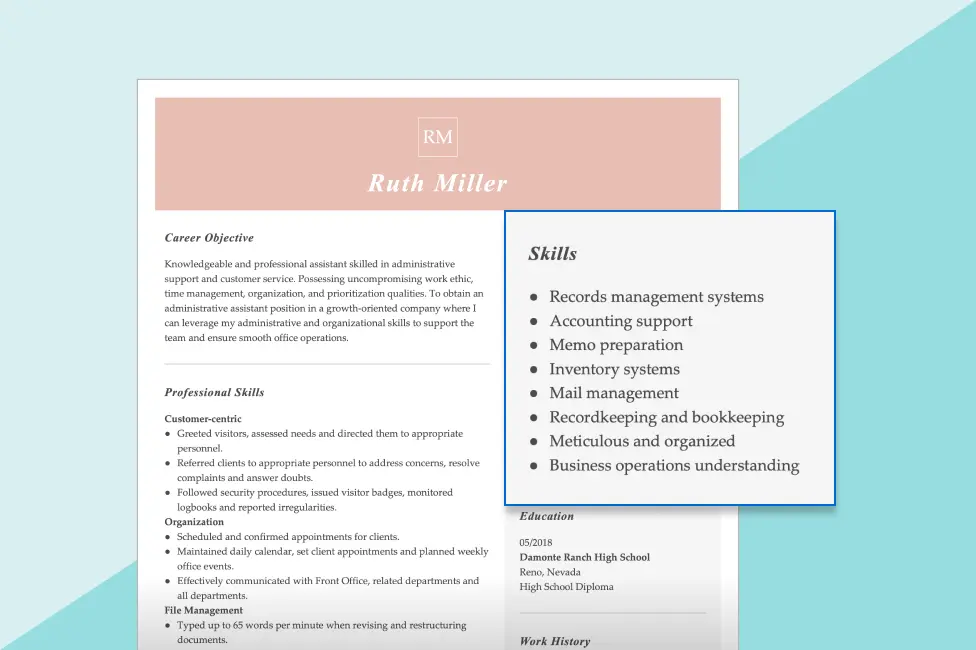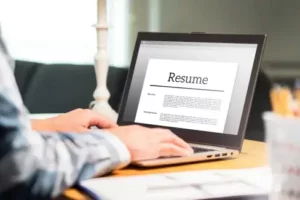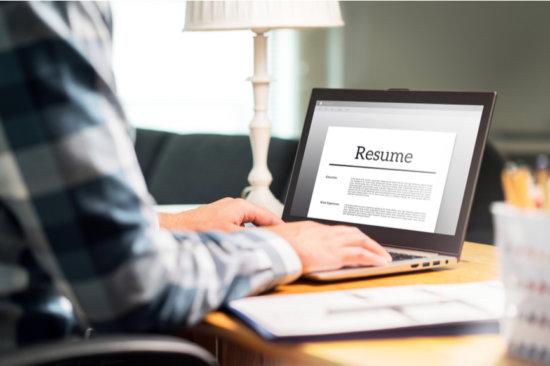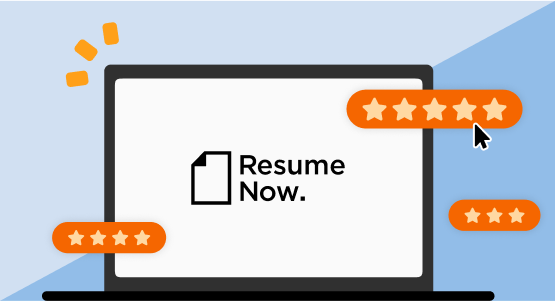251 Resume Skills That Score Interviews
Check out some of the in-demand skills that employers want! You’ll find examples of resume skills that will take yours to the next level.
Hired By:*


If you’re looking for the best skills to put on your resume, you’ve come to the right place! On this page, you’ll find:
Universal Skills for a
Job-Winning Resume
We’ve done a lot of research to help you understand some of the key skills employers seek. Plus, we included a list of skills for a resume that will help you describe your diverse qualifications accurately.
Communication:
Digital meetings, programs, e.g., Slack or Zoom, email, telephone interaction, public speaking, writing skills
Interpersonal:
Conflict resolution, personal interaction, cooperation, dependability, patience, compassion
Organizational:
Scheduling, project planning, labeling, filing, taxonomy, data structuring, calendar management
Leadership:
Motivation, intuition, inclusivity, goal setting, critical decision making, thought leadership, executing vision
Research:
Collecting data, statistical modeling, A/B testing, data interpretation, report writing, interviewing, lab experiments
Teamwork:
Collaboration, collective organization, dedication, following instructions, being helpful, listening, meeting participation
Analysis:
Critical thinking, brainstorming, creative ideas, mindfulness, thoughtful suggestions, open-mindedness, proactive solutions
Social:
Group participation, cultural competence, telephone business, trend awareness, social media skills, rapport building
Criticism:
Receptive to criticism, constructive feedback, thoughtful suggestions, flexibility, project improvement, positive reinforcement
Emotional intelligence:
Empathy, reflection, dispute resolution, social awareness, conducting interviews, building relationships
Time management:
Meeting deadlines, prioritizing, organizational strategies, calendar scheduling, self-motivation, multitasking
Creative:
Outside-the-box thinking, innovation, unique problem-solving, visual art, content creation, media building, vision execution
Customer service:
Troubleshooting, technical support, assisting clients, answering telephones, UX, efficiency, emotional understanding
Adaptability:
Quick learning, dynamic action, fast-paced business, work-from-home productivity, applying feedback, accepting changes
Self-motivation:
Discipline, desire to improve, reliability, punctuality, goal commitment, eagerness to learn, passion
Problem-solving:
Brainstorming, decision making, tackling problems, creative approaches, utilizing research, visionary solutions
Google Workspace, spreadsheet creation, coding, debugging, network setup, Python, web development
Negotiation:
Setting prices, persuasion, patience, expectation management, rapport building, deal execution, reading body language
All of these skills can be valuable to employers!
However, you’ve got to select the right mixture of skills to put on your resume.
To do that, let’s dive into a quick discussion about the different types of skills.
Soft Skills Versus Hard Skills
The distinction between hard and soft skills matters because you need a balance of both on your resume to impress employers!
Hard Skills
Hard skills refer to concrete knowledge or abilities you possess to achieve a task. They tend to be more “specific” or require training/experience. They are easy to prove or demonstrate and refer to what you do to achieve a goal.
For example, a retail clerk’s hard skills may include money handling, scanning merchandise, gift-wrapping or performing inventories.
*Top 5 hard skills for a resume:
- Data analysis
- Technical literacy
- Human resources
- AI and VR
- Design
*According to LinkedIn’s analysis¹ of skills referenced in their job posts, these are the most wanted hard and soft skills for 2022:
Soft skills
Soft skills or “people skills” are personal attributes that relate to how you work and interact with others.
Teamwork, communication, positive attitude, and adaptability are all soft skills that carry from one job to the next. Soft skills tend to be more difficult to demonstrate, measure, or put into numbers than hard skills.
*Top 5 soft skills for a resume:
- Communication
- Critical thinking
- Empathy
- Adaptability
- Social influence
Why you should list both types of skills on a resume
- Soft skills create a positive and functional work environment but aren’t enough to perform job duties.
- Hard skills are necessary to achieve work tasks or goals, but they don’t indicate how you interact with others.
Both skill types combined will paint a better picture of your work style.
Technical skills
Ultra-specialized hard skills are called technical skills.
For example, while “computer proficiency” is a hard skill, training or practicing in a highly specialized programming language like HTML, CSS, or SQL is a technical skill.
Technical skills matter because if you’re applying for a job that requires advanced practice, training, or education, you won’t get hired without them.
Technical skills examples
- Adobe Illustrator fluent
- Forklift operation
- Subaru repairs
- C++ expertise
- UX Design
- Javascript
So, if the job requires it, be sure to include a mixture of soft, hard, and technical skills in your resume.
The Most-Wanted Skills by Industry
Each job industry seeks a specific set of skills. To help you brainstorm, check our career-specific examples of skills for a resume:
Administrative
- Filing
- Data entry
- Typing, e.g., 80+ words per minute
- Zoom scheduling
- Microsoft Office
- GSuite
- QuickBooks
- Salesforce
- Calendar management
- Presentations
See examples of administrative resumes.
Child care
- First-aid
- CPR
- Patience
- Planning
- Imagination
- Creative activities
- Scheduling
- Parental updates
- Compassion
- Boundary setting
See examples of child care resumes.
Cleaning
- Thoroughness
- Safety-first attitude
- Physical stamina
- Able to lift 50lbs
- Reliable
- Punctual
- Efficiency
- Self-motivation
- Following instruction
- Positive attitude
See examples of Cleaning resumes.
Construction
- Measuring
- Problem-solving
- Machine operation
- Tool knowledge
- Safety procedure
- Reading blueprints
- Following directions
- Teamwork
- Physical stamina
- Meeting project deadlines
See examples of construction resumes.
Cosmetology
- Styling
- Color treatments
- Blowouts
- Client-first attitude
- Skin treatments
- Upselling
- Product knowledge
- Attention to detail
- Rapport building
- Up-to-date on trends
See examples of cosmetology resumes.
Customer service
- Empathy
- Active listening
- Responsiveness
- Written communication
- Verbal communication
- Sticking to script
- Providing solutions
- Customer retention
- Friendliness
- Issue documentation
See examples of customer service resumes.
Education
- Public speaking
- Multimedia learning
- Inclusiveness
- Group activities
- Syllabus creation
- Lesson planning
- Curriculum adherence
- Test-score improvement
- Productive assignment
- Mentorship
See examples of education resumes.
Entertainment
- Event planning
- Crowd engagement
- Sales
- Writing
- Promotion
- Production
- Social media content
- Media generation
- A/V setup
- Sound coordination
See examples of entertainment resumes.
Events
- Planning
- Coordination
- Timing
- A/V logistics
- Client rapport
- Networking
- Sound engineering
- Scheduling
- Cross-functional collaboration
- Off-site events
See more examples of events resumes.
Food service & culinary
- Health code compliance
- Strict quality standards
- Food knowledge
- Trained palette
- Knife technique
- Reliability
- Self-motivation
- Mise en place
- Cost reduction
- Ordering
See examples of culinary resumes.
Hospitality
- Guest-first attitude
- Adhering to service standards
- Attention to detail
- Natural conversation
- Physical stamina
- Calm under pressure
- Executing requests
- Conflict resolution
- Promptness
- Recommendations
- Commitment
See examples of hospitality resumes.
Human resources
- Survey creation
- Payroll coordination
- Internal emails
- Presentation
- Policy knowledge
- Feedback
- Empathy
- Active listening
- Price comparison
- Event organization
- Conflict resolution
See examples of HR resumes.
IT
- Project management
- Product research
- Network maintenance
- Computer installation
- Debugging
- Cloud management
- Ticket response
- Corporate licensing
- UX
- Budget monitoring
- Machine learning
See examples of IT resumes.
Maintenance
- Repairs
- Scheduled upkeep
- Problem-solving
- Machine knowledge
- Prompt response
- General fixes
- Lawn care
- Yardwork
- Plumbing
- Electrical
- Carpentry
See examples of maintenance resumes.
Nursing & healthcare support
- Taking vitals
- Patient assessment
- Compassion
- Reading charts
- Record keeping
- Organization
- Medicine administration
- Preparing tools and instruments
- Modern health code protocol
- Use of MRI, X-ray, or CAT Scans
- Glucose monitoring
See examples of nursing resumes.
Retail
- Customer service
- Product awareness
- Cash handling
- Payment processing
- Upselling
- Brand focus
- Teamwork
- Loyalty building
- Clear communication
- Promotional help
See examples of retail resumes.
Safety & security
- Video monitoring
- Threat surveillance
- Crowd control
- De-escalation
- Loss prevention
- System installation
- General safety
- Team coordination
- Clear communication
- Integrity
See examples of safety and security resumes.
Sales
- Persuasion
- Negotiation
- Persistence
- Meeting set quotas
- Attaining growth
- Building client rapport
- Exceeding benchmarks
- Messaging
- Product knowledge
- Passion
- Marketing/advertising
See examples of sales resumes.
Social service
- Documenting cases
- Accessibility
- Proactive solutions
- Counseling
- Creating
- Sociability
- Digital community outreach
- Results-driven
- Working with children
- Training
See examples of social services resumes.
Teaching
- Lesson planning
- Curriculum development
- Classroom management
- Student growth
- Achieving test benchmarks
- Professionalism
- Multimedia presentation
- Cultural awareness
- Evoking enthusiasm
See examples of teaching resumes.
Job-Specific Skills Tips
for Your Resume
To see resumes skills examples you can search by job title.
SEARCH BY JOB TITLE
For popular job titles, we have a special series of skills writing advice guides:
Better yet, if you want job-specific skills suggested for you, then you should consider using LiveCareer’s Resume Builder.
The builder helps you write your resume because it automates the whole process into a series of prompts and provides skill suggestions for the job you’re applying for.
That will make writing the skill section a breeze. All you have to do is click the skills that best describe you.
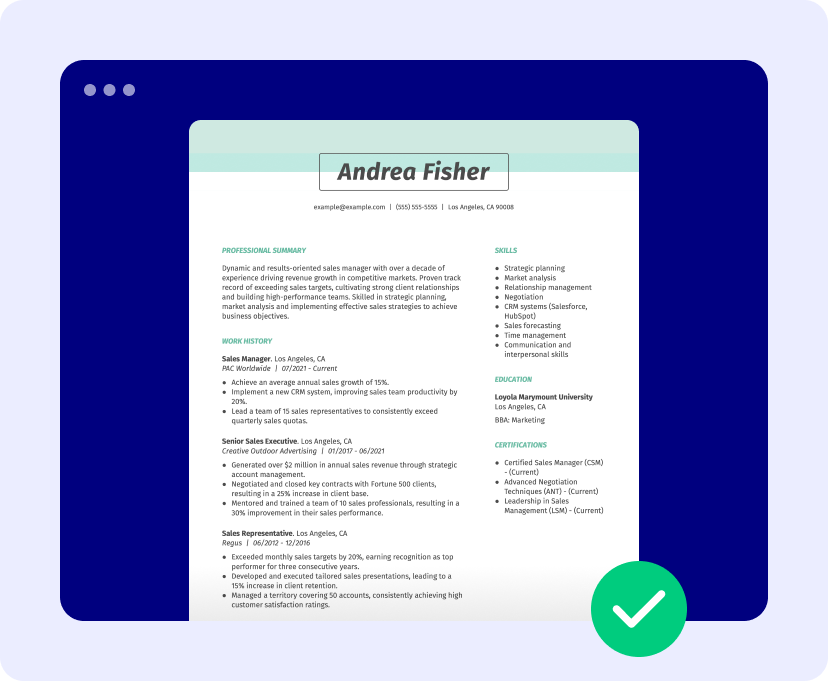
How to Write a Resume Skills Section
To put the best skills on your resume, follow this easy four-step process:
Step 1
Review the job post carefully!
If you’re serious about a job, this is 100% the most critical advice:
Perform a close read of the job post or ad to identify the skills and abilities mentioned.
Write down all these keywords that apply to you in a list.
Then, tailor your resume to include all of these critical terms! Failing to do so may cause your job application not to pass an ATS. You should always update your resume for each job application, and switching and replacing skills for ones more relevant to your desired job is one of the most straightforward ways to do so.
You can also take this a step further by doing some background research about the company to better understand its needs and values.
Step 2
Choose the proper resume format.
A resume format is the structure or way in which your information is presented and organized on the page. It affects your skills section’s placement and how much focus it gets.
To write a great resume, it helps a lot to pick a format first.
You should choose a resume format based on your work experience level, i.e., how many years you’ve been doing your job.
There are three main resume formats:
Chronological formats are the most commonly used, and they focus the most on your work experience.
In this format, the skills section lives under the work experience section, which gives it less visual weight.
That’s because the chronological format is ideal for job candidates with 10+ years of experience to outline. Their work history is the main selling point.
Functional formats are sometimes known as skills-based resumes because they put your skills front and center at the top of your resume.
The skills section lives above your work experience, just underneath the objective statement or professional summary.
The functional format is recommended for job hunters short on previous work experience, with three years or less!
It’s meant to take attention away from your lack of experience.
Combination formats are a mixture of the functional and chronological formats, giving equal weight to skills and work experience.
This format is perfect for job seekers with three to ten years of experience.
It’s also wise for job seekers who are:
- Seeking a job that is a promotion from their current role
- Applying to work in a new industry
- Transferring from military to private employment
- Re-entering the workforce after a long absence
Once you decide on a resume format, you can then find a resume template in this layout.
Step 3
Put skills in your professional summary
work experience.
A dedicated skills section isn’t the only place you should highlight your best abilities.
You should also add skills to your professional summary and work experience sections.
The professional summary is a two-to-three-sentence paragraph that sits below the header on your resume.
It should include your most impressive career statistics or top skills relevant to the job to appeal to employers.
If you identified “data-driven,” “PowerPoint presentations” and “statistical modeling” as key terms used in the job post, here’s an example of how to weave that into a solid professional summary:
“Data-driven financial analyst with 4+ years experience predicting market trends and refining investment strategies. My methodical nature informs my PowerPoint presentations, top-notch statistical modeling and forecasting abilities.”
For your work experience section, use the same strategy. Pepper skills into work history bullet points.
Say a bartender is looking at a job post and identifies “craft cocktails,” “high volume,” “hospitality,” and “consistent” as key skills for the employer.
Here’s a sample of how you would incorporate those skills into your work experience section:
- Thrived in a high-volume 400+ person venue
- Developed knowledge of craft cocktails on a 12-drink menu
- Produced consistent, balanced drinks
- Developed a following of regular guests with genuine hospitality
Step 4
Reinforce, don’t repeat your skills.
Don’t list the same skill twice when you’re writing your resume.
Instead, if you identified being “a team player” as a main focus of the job post, include other similar or related skills that support your claim.
For example, you could include “team player” as a strong resume buzzword in your skills section and back it up by saying you “worked collaboratively” in a work bullet point or describe yourself as “a dedicated contributor” in your professional summary.
A Faster Way to Write Your Resume Skills!
By now, you’ve noticed a lot of thought and planning is required to create an eye-catching resume from scratch.
That’s precisely why you should consider using a resume builder. A builder allows you to skip the tedious steps and focus on quality resume content.
It helps you by:
- Taking care of design elements, so all you have to do is pick a style you like
- Provides skill suggestions you can choose from, so you don’t even have to write them!
- Automates the whole process and makes you feel like an expert is guiding you, prompt-by-prompt
- Provides grammar and spell check, so no errors hurt your job chances
FAQ
What skills do I put on a resume?
To know, here’s a simple trick: the answer is in the job post or ad. Don’t talk about every single ability you bring to the table. Instead, use the job post or ad to focus on the skills that best apply to employer needs. You should tailor your resume to every job this way! It’s the most direct way to appeal to a hiring manager.
What are transferable skills?
Transferable skills are skills that can be transferred from one job to another, especially when changing industries.
Including transferable skills on your resume can help hiring managers feel confident that you can do a job they have never hired you to do before!
Here’s an example:
If you worked as a server but wanted to pursue a new career as a yoga instructor, you could list transferable skills like clear communication, preparation, timing, physical stamina, quality assurance, and responding to feedback in your resume.
That way, you have a foundation for making a convincing case for your success in the new role!
Transferable skills have grown in usage since the pandemic caused many people to switch their career industries.
How many skills should I list on a resume?
In a resume skills section, it’s standard practice to list six to eight skills.
However, you must also include skills in other places in your resume!
For a professional summary or objective statement, which sits near the top of your resume, highlight your top two to four skills.
In your work experience, however, the sky’s the limit. If you can fit a skill into each work experience description, that’s ideal.
Still, don’t overdo it; try to keep it to a maximum of two skills per bullet point.
How to format skills on a resume?
Use bullet points in a one or two-column structure to format your skills section. Include a total of six to eight skills. For example:
- Telephone etiquette
- Spanish fluency
- Spreadsheet creation
- Making sales
- Trust building
- Scheduling
- Product knowledge
- Social grace
Bullets are short, sweet, and easy to read and scan. They’re not the only option, though!
Some people choose to list their skills separated by commas. For example:
Telephone etiquette, Spanish fluency, making sales, trust building, product knowledge and social grace
How can you list technical skills on a resume?
Technical skills are a more specific type of hard skill and should be listed in your dedicated skills section. Here’s a sample of how to put technical skills on a resume:
Technical skills
- Program debugging
- UI Interface
- UX Design
- HTML coding
- SEMRush
Also, mention two or three critical technical skills in your professional summary. Any additional technical skills can be mentioned in your work history.
What skills are good for an entry-level job?
If you lack experience, it’s good to highlight your positive attitude, eagerness to do a good job, and ability to learn.
Using terms like helpful, fast-learner, friendly, hardworking, self-motivated, professional, dedicated, or passionate can help!
After all, many employers would instead hire someone enthusiastic with less experience than someone practiced but is uninspired.
Also, check out our guides for:
How do I include skills in my cover letter?
Cover letters are slightly different from resumes in how you showcase your skills.
In a resume, you only need to list or briefly explain your skills, but in a cover letter, you should tell a story to back up your claim.
We have a complete guide on how to write a cover letter that will explain every step!
Of course, if you want next-level help, you could also use our Cover Letter Generator.
It comes loaded with pre-written, skill-dense sentences to include in your cover letter!
How We Reviewed This Article
Over the past 15 years, we’ve helped more than 10 million job seekers build stronger cover letters, discover their career paths, interview confidently, and boost their chances of finding the right job faster. Review our Editorial Policy to learn more about our process.

